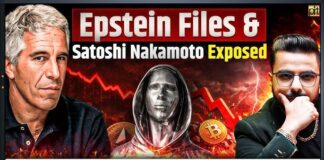From TheEpochTImes:
In part one of this American Thought Leaders episode, mRNA vaccine inventor Dr. Robert Malone explained the latest research on COVID-19 vaccines, booster shots, and natural immunity.
Now in part two, we take a closer look at repurposed drugs like ivermectin and how a universal vaccination policy could actually backfire—and bring about the emergence of vaccine-resistant escape mutants.
At their core, vaccine mandates are not just unethical and divisive, but also “impractical and unnecessary,” says Dr. Malone.
You can watch the first part of this episode here.
Jan Jekielek: This is American Thought Leaders, and I’m Jan Jekielek.
Dr. Robert Malone: We’re now in this odd position, where there are groups of physicians that believe that they have protocols that are quite effective in preventing death and disease and hospitalization. When deployed early, their ability to employ these methods and these agents is being actively resisted by the government and by various large national organizations.
With physicians not being allowed to prescribe, pharmacies not filling physicians prescriptions, physicians being prohibited from practicing what they believe to be good medicine in hospital environments, and overlaying this is the sense that those who discuss these matters are subject to censor or censure, in the form of risking losing their medical license.
That is something that has been threatened by the national medical board and has been implemented in some other countries like the UK and Canada. And that’s also, I think, created an even more sense of unease and consternation. Why would the government be denigrating these agents that are known to be safe—have been used for decades.
Mr. Jekielek: With people, not just horses, for the use of ivermectin. I mean, this has been one of the most… I just have to comment. One of the most bizarre memes or disparaging comments that I’ve seen is people dismissing this drug, which is, could I say used by millions of people daily probably in the world, for parasites and so forth. It is just a horse drug, right? How could people take this? This is the meme. I mean.
Dr. Malone: This was triggered by an FDA Twitter account that this is what initially led this. was an FDA Twitter account that used the term y’all to express that… Didn’t people understand that ivermectin was a horse drug? And this was picked up by the media and it fueled kind of a self-reinforcing thing that was then further fed in by certain government officials.
We ended up with this amazing kind of explosion over the span of about three days immediately preceding the licensure of denigration of ivermectin as a horse drug. And I was asked, why are people? As you know, I have horses. I have ivermectin for horses. And I happened to also have ivermectin for myself, for my long COVID.
I’m very familiar that there are different form factors and I would never take…I would absolutely never take the liquid ivermectin that is for sale in many feed stores. This is formulated for cattle. I wouldn’t give that to my horses, let alone take it myself. And the horse stuff is formulated as a paste for the horses to adjust for bots and other intestinal worms.
And the truth is that the dose that’s used for horses by body weight, is the same dose that’s recommended for humans, but it’s formulated and manufactured to a quality standard that’s very different from what’s used by humans.
So there’s this meme that erupts about ivermectin being a horse drug. And why would people be taking this in lieu of a vaccine? That was how that was pressed. These crazy people, they’re vaccine hesitant, but they’re very glad to take horse paste. My point of view on that, is that what it showed was that the focus was all on the prophylaxis, in the sense that these drugs are being used in lieu of vaccines. My sense is that people are seeking and have been seeking out ivermectin to treat themselves early in the course of infection, because there are no other alternatives.
The standard policy in hospital management of COVID and medical management of COVID in the United States remains. If you go to the doc, you go to the ER, you say, “I am having respiratory distress.” They check your blood oxygen levels, and they see that you’re at 92 or 93, as opposed to say 98 or 99 on room air. And they say, “Go home and come back when your lips are blue,” is the metaphor, which means that your oxygen saturation will be about 88 or so. So folks are being sent out knowing that they’re at risk of being hospitalized, and no therapies are offered. And they’re a little desperate.
Mr. Jekielek: I’ve said one kind. So isn’t there this monoclonal antibody treatment that Ron DeSantis?
Dr. Malone: Yes, very expensive and he set up infusion centers. I think that’s a great credit. So that is an option. But that means if you’re in the field, you’ve gotta drive out to one of these centers, get all the approvals and everything else. A lot of folks hear that ivermectin, by the rumor mill, is effective. And in my opinion, the truth be told, there are a lot of studies that are not definitive. They’re underpowered in many cases, not often done in emerging markets of ivermectin.
There is one meta analysis of all those studies done by Cochrane Reports that say that the data is still inconclusive, and there are two other meta-analyses that have come out that say, “It’s pretty clear this works.”
Tess Lawrie is one of those advocates. And to say that there’s no evidence in favor of using ivermectin, when you have governments all over the world using it, deploying it. In Mexico, it’s over the counter for this very reason. And India, it’s now being used widely [with] some attributed to the sudden decline in Delta, mortality and morbidity in India since they have started deploying it.
Mr. Jekielek: Hopefully, there’s some robust study being done currently, right?
Dr. Malone: That’s the thing. That’s another one of these mysteries. We’re now a year and a half into this. This agent has been known for quite a while, to appear to have activity sufficient that there have been many of these small underpowered studies done in emerging markets that are encouraging. But the capital to do a large well-powered study, like say was done with dexamethasone, involving thousands and thousands of patients that would give a definitive answer to this. Why hasn’t that been done?
This feeds into what we talked about conspiracy LEGOs, where there are folks that see these paradoxes in how the response has been managed. And they have a tendency to take these fragments of information that are kind of non sequiturs. They don’t add up—they don’t seem to be good public policy.
Why is it happening? Why did you have Merck come out and say that ivermectin is toxic?. And make a clear statement that ivermectin is toxic. When in fact it’s been… It is a WHO essential medicine as hydroxychloroquine is, and has been widely used throughout the world for 30 plus years, and is generally known as one of the safest drugs in the pharmacopeia.
What would motivate Merck, which held the original patent and has been giving ivermectin free for river blindness to Africa for years and years and years. What would motivate them to suddenly come out with a clear unambiguous statement that ivermectin is toxic? It doesn’t make sense.
And sitting on the active committee of NIH, I saw the same logic being promoted when the NIH made an executive decision to perform an outpatient study of ivermectin, called ACTIV-6. And there were strong objections by pharmaceutical representatives that were sitting on the active committee that the NIH would even consider doing this.
Now the point is raised that these companies have a financial conflict of interest. Merck is actively developing its own antiviral. Pfizer is actively developing its own antiviral now. And Pfizer has come out and said explicitly that we cannot control this outbreak; this virus, with vaccines alone. We’re gonna have to have drugs. Anthony Fauci has come out and said, “We need to have drugs that they’re focused on the new drugs.” The antibodies have generally proven useful, in some cases, they’re very expensive. They’re-
Mr. Jekielek: The monoclonal antibodies.
Dr. Malone: Yeah, the monoclonals.
Mr. Jekielek: Yeah.
Dr. Malone: Very expensive. They’ve gotta be administered in infusion centers. So you can’t just go take a pill and get it from your local Walgreens. There is this kind of cascade of this that doesn’t make sense around the use of repurpose drugs in early intervention.
That also, I think, has got a lot of people on edge a little bit and questioning public policy. And it goes back to the position of my Latin American colleagues that I was telling you about earlier, that I was on the phone with, they were saying, “We’re using ivermectin all the time. It helps, in our opinion. And we’re using hydroxychloroquine.”
Mr. Jekielek: Just one quick comment; something that is just occurring to me. If you’re a doctor in your community, you’re directly accountable to your patients. I mean, i.e., if you’re saying something works and it doesn’t work, people will notice very quickly and you won’t have any patients very quickly. This is just what’s-
Dr. Malone: Contrapositive is true also. So you end up with some physicians that are being absolutely overloaded with patient demands. Pierre Kory is an example of that, the poor man just can’t get a break. He’s been at the forefront of the FLCCC coalition, and developing a lot of these protocols that are being deployed widely through the United States, by select physicians, early adopters. I experienced this to some extent. He is absolutely flooded with patient calls and physician calls about his protocols and how they can be used. And he’s just one guy.
Peter McCullough is another example at Baylor, that has been a firm advocate. He actually has four peer-reviewed papers on these early treatment protocols. He’s been sued by Baylor. He’s been disparaged right down to the Wikipedia editing that has happened—in my case also.
There’s kind of coordinated strategies that are used for any of us that are dissenters in terms of the policy that there shall be no early intervention. These docs that have been at the forefront of developing these early intervention protocols have been subjected to a lot of derision and attacks and character assassination.
What I’m experiencing personally, because I’m part of that cohort now is we’re coming together. We’re being brought into contact with investors, donors that are not comfortable with the current public policy and are very interested in enabling these alternative strategies and their availability. We’re being brought into contact with political decision makers, elected leaders that are very interested in seeing whether these types of strategies can impact on the health and wellbeing of their populations.
They find it attractive that these are agents that are quite inexpensive. Because a lot of these intervention strategies, where we allow the patients to get really sick and then go to the hospital, that’s a burden on state budgets, and not to mention political liability when you’re seeing major outbreaks in places like Louisiana and Florida.
I mean, Ron DeSantis, his fortunes are less solid than they might’ve been a little while ago before he had this outbreak. One of the things I find fascinating about that is that the press is very glad to make a point that right now we’re having more of a red state outbreak and associating that with a vaccine uptake, or vaccine hesitancy. When you look at the data, there isn’t that much of a disparity in vaccine uptake.
For instance, in Florida, the vaccine uptake is really fairly high, particularly among the elderly. So how do you describe this? And you dig into the data, how do you make sense of it? I think there’s a possibility that there is a seasonal component going on here, and we’re seeing some of that wave of infection starting to move north.
The other thing that’s been a confounding variable in all this, is a respiratory syncytial virus [RSV]. I think we touched on this. There was a lot of press about the pediatric ICU filling up, et cetera. And the assumption was that they were COVID cases. They weren’t. For the most part, they were respiratory syncytial virus cases, which is fairly different in presentation from COVID and also affects elderly, by the way.
We become politicized and polarized, and we want to see these outbreaks and these events and these waves of infection as reinforcing some stereotypes that we have about this state’s behavior—that state’s politics. And I think that over the next few months, we may find that we have to…
If we’re willing to look the data in the face, we may have to re-examine some of those assumptions that this may not have been as much a function of vaccine compliance or uptake, or a lot of euphemisms we could put around that, but rather some fundamentals of the underlying viral epidemiology in spread that are not really well understood right now.
We certainly know that most respiratory viruses move in these kinds of waves through populations. It may be that we find that this wave of infection that’s currently infesting the south isn’t gonna be restricted just to the south over the next couple of months. Time will tell.
Mr. Jekielek: You were saying there’s some real potential issues with the idea of pursuing a kind of policy of universal vaccination. Escape mutants, that might not be something all our viewers are familiar with.
Dr. Malone: So this gets to fundamentals of basically Darwinian evolution to really understand this. What the term escape mutants refers to is a virus isolates that are no longer as susceptible to the control of infection and spread provided by the vaccine, by the immune response generated from the vaccine. So they are escaping immune surveillance provided by the vaccine. That’s the nature of the term escape means—mutants in that, the viruses…
There’s another paper out recently that shows that the mutation rate of this coronavirus is much higher than we had previously estimated. So the way it works with virology, is that it’s as if you’re breeding a dog. And you have a litter of dogs, and you’ll know that if you have six dogs, one or two of those, are gonna be pretty good keepers. You might wanna sell the other ones off. For instance, if you’re breeding for the ability to hunt.
In the case of a virus, it’s like the parent virus has millions to billions of children. And many of those have genetic modifications, mutations, that make them genetically different from the source virus. And this works for viruses because they only have a small number of particles. Infecting a third person, another person, is sufficient to rekindle the whole infection cycle.
I was talking to a friend of mine, Chad Roy, who’s a primatologist, that’s working with the SARS coronavirus down at the Tulane Regional Primate Research Center. He has some interesting data that’s gonna come out soon where they’re tracking the evolution of the virus during the course of infection in a given primate.
In his case, he was fascinated that he was seeing evolution of virus strains to become more able to infect the gut, and were actually hiding in the gut. So this process of evolution, which also occurs with AIDS, with the AIDS virus. you can track the genetic changes in the AIDS virus during the course of an infection. It’s amazing to watch.
So anytime a virus is infecting a host like us, it’s generating these mutations all the time, and those mutations are constantly being selected for fitness as the technical term, right? The Darwinian term. They’re being selected for fitness to reproduce. And what that means is that the environment of the host, has things which restrict our immune system, is the notable one— restrict the ability of the virus to replicate and spread. And the viruses in the host are in a constant battle where our immune systems are adapting to try to control that virus, and the virus is constantly escaping those adaptations.
Mr. Jekielek: And those are the ones that survive, right?
Dr. Malone: Those are the ones that survive and get transmitted. They either replicate in the host or they get transmitted to third parties.
I’m gonna cite another paper. There’s some really good veterinary work in what’s called Marek’s disease—which is a viral infection of chickens. This is what has many virologists concerned as a model system. In the case of Marek’s disease, if you have an active outbreak of Marek’s disease in chickens, and you start vaccinating against Marek’s disease during the outbreak, what you will do is drive the development of viruses that are able to escape the vaccine. In the case of Marek’s disease, they actually become more severe in terms of the disease that they cause.
So that’s another one of those worst case scenarios like I talked about—high zone tolerance. And I previously talked about antibody dependent enhancement, or a vaccine enhanced infection or disease. There are these situations in normal viral biology and vaccinology that give experienced immunologists and vaccinologists a certain amount of concern and pause.
Based on Marek’s disease and other examples, there are many virologists, and I’m one of them, that are concerned that the policy of universal vaccination at the time when we are having a very active outbreak that’s global, creates the risk that we will drive the immune response of the entire population towards a single endpoint—towards a common outcome in terms of antibody responses.
And there’s another very nice paper, just out recently from Michael Diamond’s laboratory, at Washington University, that shows that in fact, we are getting remarkably consistent B-cell responses to the vaccination. There’s an appearance that in the effective antibodies, there’s a small number of epitopes that are protective in spike. And by only using spike as an antigen, we’re driving all of our immune responses towards some common endpoints of immune response against certain domains in spike.
It can be shown that viruses are evolving during the course of this infection and the use of vaccines in this way to start to escape those selective pressures from antibodies against those certain domains. Spike is an interesting protein. It has a lot of sugars all over it and other things that are used to evade immune response already.
The concern is that by deploying vaccines broadly, the same basic vaccine, all these genetic vaccines, all employ spike as an antigen, for driving the whole human race towards a common endpoint. And we’re driving the virus, that’s infesting us to evolve to escape that common endpoint. And there is a risk that at some point in time, we may have basically a superbug evolve, which will now evade that immune response.
Now, an example that your listenership may understand better is the idea of antibiotic resistance. When we deploy antibiotics unnecessarily and very widely, we know that we develop antibiotic resistant bacteria. The same concept applies in vaccinology with viruses.
So what would happen? Should we have an emergent super virus that is able to evade the spike vaccines, it is likely that it would cause disease in those that have only received the vaccine as opposed to those that have had natural infection and have much broader immune responses. And it would place those that have primarily relied on the vaccine for protection that are at high risk of disease and death—in other words, the susceptible and elderly.
Suddenly their first line of defense falls away because the vaccines are no longer effective. And so the risk is, with this universal vaccination strategy, by driving the development of viruses that are able to evade the immune responses elicited by the vaccines that we risk creation of virus strains that are able to evade that.
And paradoxically, the people that it will put at risk are the very people that need the vaccine the most, which is our elders and those that have pre-existing medical conditions and morbid obesity. So the logic is, vaccinate those. Reserve the vaccine for just them and don’t vaccinate the general population that are at extremely low risk—fraction of a fraction of a percent.
Mr. Jekielek: And some more studies that came out recently that basically verify that, I suppose, yeah.
Dr. Malone: There have been. There’s been about three of them that have come out sequentially that are all consistent with this hypothesis. So that’s the other leg of the stool. That’s kind of caused some growing concern about our current public policy and vaccination, is that we are seeing signs of the emergence of these vaccine escapians. Now there’s a new strain popping up, I think in South Africa, that seems to be more resistant and there are further evolution of the Delta strains that seem to be more resistant.
So like with all science, we can’t prove that this is gonna happen. This is a forward-looking risk assessment. We’re not there yet. I would prefer that we don’t get there. I think probably we can all agree on that. I’m not saying that we’re absolutely going to get there, but I’m saying that myself and many others believe that our current policy places us at increased risk to having this kind of unpleasant outcome and losing the benefits of the vaccines, which as I’ve mentioned, I believe in. I believe we’ve saved a lot of lives. I believe those benefits are best administered to the people that are most susceptible to death and disease, and to reserve the vaccines for those people.
Mr. Jekielek: As we finish up, I just wanna get a few thoughts from you about vaccine mandates and vaccine passports, because this is the big question right now. There’s a number of cities, New York City, San Francisco, that have imposed pretty significant vaccine mandates— mandate passport, it kind of becomes a bit of a …
Dr. Malone: Mandate, passport, quarantine. There’s a whole cluster of these kinds of more controlling, let’s say gently, some might say authoritarian measures that are being advocated, in some cases. Quite forcefully down to the recent Toronto Star headline, basically saying we shouldn’t even really provide medical care for those that have not taken the vaccine, that get infected, seemed to have crossed some cultural lines here about our attitudes, about the rights of the individual versus the rights of the collective.
And these mandates have really brought those discussions and issues to forth. But I still believe that in medical care, I believe in the rights of the individual patient to elect, to accept, or reject care. And clearly the argument is made that the population in general has a right to insist that the individual comport with activities, which will reduce risk to the population.
Their behaviors, that we all agree as a culture, we’re not going to accept because they create risk for all of us. And we generally try to draw the line that you have the freedom to do what you wanna do so long as it doesn’t harm me. And this issue of vaccine mandate falls right into that junction of, is it ethically acceptable to mandate that my brother accept a medical intervention that my brother doesn’t wish to take, in order to protect me from risk?
Now, in my mind, the answer to that ethical conundrum is really straightforward. If I’m at risk, I have the option to accept a vaccine. We’re now in a position where we have vaccines. It’s not like it was a year ago. If I’m a person at high risk and I feel the need to have protection, that protection to the best as available is, I can avail myself of that.
Now the argument is made that this falls down because vaccines really work through herd immunity. And by my not accepting a vaccine, or you’re not accepting a vaccine, you’re putting the population, the herd, at greater risk by being an individual susceptible to infection spread.
Now that logic is harder to sustain with leaky vaccines. With vaccines that are something in the range of, we could argue 40 to 60 percent protective against infection, replication, and spread is still looking like they’re 80 to 90 percent protective against disease and death. But in terms of herd immunity, that CDC Slide Deck that I referenced earlier, doesn’t get us there. We can’t get there with these vaccines. They’re not potent enough to have sufficient activity in blocking infection spread.
So the logic of mandates is that the vaccinated contribute to herd immunity that will make it, so the whole population is able to economically recover, go about their business, live a normal life, et cetera. That’s no longer really consistent with the data that we have about the effectiveness of these vaccines. In fact, if from first principles, if you were to say, “Hmm, what is the best way to get herd immunity?”
Now, what we know about natural infection and natural immunity, we would say, it would be to allow the people that are at low risk for death and disease to become infected, because that’ll give them the broadest and most robust protection. Now that translates into… They used to have chickenpox parties, and that translates into the logic of COVID parties. I’m not advocating that, by the way.
Mr. Jekielek: I’m just thinking of the Science article. I think the drop head was, “No infection parties, please.” Right?
Dr. Malone: Precisely. Because why were they saying that? Why that caveat was necessary, is because it’s actually a logical corollary of the data to say, there is merit to the idea of getting natural infection. A case could be made because there is data suggesting that Delta may be actually more pathogenic. A case could be made that those that were on the front edge of the infection wave like myself, undoubtedly got infected with an alpha strain, which was potentially less pathogenic. We’re better off than those that are now gonna get infected by Delta.
Now, I’m not advocating that. But if we’re gonna be strictly rigorous in our thinking about the underlying logic here, the logic that supports mandatory vaccination to protect the population, to mitigate the risk of infection and economic disruption in the workplace or elsewhere, that’s no longer tenable.
Let me give you another example. I’ve had a series of conversations with a high-profile actor, working for a very high-profile studio, both of which I’m not gonna name. The studio’s position was you have to take the vaccine because we have risk. We have financial risk. We have financial risk if the production goes down. We have financial risk of being sued by the gaffers and the other personnel involved in the film production, if they get infected, potentially is a consequence of this high-profile person, and we have to mitigate that risk. We have no choice— we’re a big company, okay?
And that logic, which was built over the last few months, if you dissect it, it’s now no longer tenable, because the vaccinated, as well as the unvaccinated, create risk of infection and spread. I think that mandates are tenuous in a fundamental bioethical way. They violate the concept of the integrity of self and the rights of the individual to accept or reject medical treatment based on informed consent; which we do every time you go and have a surgical procedure.
When I had my colonoscopy, I had to give informed consent and they had to explain the risks, right? And we’ve said that, well, in the special case of vaccines, because of herd immunity, we’re gonna let that ride.
But then the underlying thesis that this is gonna get us to an endpoint—we’re gonna compromise our ethical principles because it’s gonna yield a favorable result that gets back to my point about the social contract. We’re gonna insist and reinforce that you take this product to provide a benefit that actually isn’t there. It’s not gonna get us to the point where we’ve mitigated the risk to your fellow man.
So for me, I find the mandate logic to be divisive, authoritarian, impractical, and unnecessary. It creates a situation in which we are forcing the fundamental ethical conundrum of the rights of the collective versus the rights of the individual into an already inflamed political situation. I don’t see how it gets us where we wanna go, which is returned to normalcy economically and in every other way. It doesn’t provide the protection, that is the underlying logic. It divides us at a time when we test currently needs less division, please.
So now we have this situation, where it’s an amazingly inflammatory logic, as exemplified in the Toronto Star front page, where we have groups of populations turning against each other. And people often cite the language. And the example, again, of how the Jews were characterized as a special population to be discriminated against because of intangible illogical arguments that weren’t grounded in reality.
And many note that there is similar language and objectification and depersonalization associated with a lot of these statements that are driven just as they were then by fear, getting back to our starting point. This is not about me. It’s not about whether my feelings are hurt by the Atlantic monthly or some junior journalist or somebody that’s fact checking me—I’m a big boy, I can withstand that.
What bothers me is not those kinds of things, it’s these underlying logic flaws that are tearing at the heart of the integrity of our public health system and trust and our body politic. And I think that it’s high time for everybody to take a deep breath and look at the logic of what we’re confronting. What are the data? And the criticism that I’m trying to tear down vaccines or tear down this vaccine or that vaccine, please, I’m trying to help people to grapple with the data, the true information, the underlying truth.
I believe there’s a valid counter narrative to the very simplified narrative that is being so avidly reinforced and enforced through censorship, social media, and information management at so many levels. It’s like that whole system, that juggernaut, has gotten so wrapped up around a consensus set of truths that are failing now.
So I think we all take a deep breath, come to terms of the data, and many publications that you’re gonna share as footnotes in this. And I hope that our discussion today can help folks think for themselves. I don’t have the answer. I know that for a fact. I have a lot of questions. I’m a scientist. I’m trying to raise valid concerns and spark thought, so that we can avoid bad consequences by just going along to get along, and assuming that the dominant narrative is the only option.
Mr. Jekielek: It’s such a pleasure to have you on.
Dr. Malone: Thank you. It’s always a pleasure. And I welcome the next time you give me a ring or send me a text and ask me another penetrating question that will spark more thought.
This interview has been edited for clarity and brevity.
Below is a list of references mentioned or related to the discussion in this episode:
“Ivermectin for preventing and treating COVID-19” — The Cochrane Database of Systematic Reviews
“Use of Ivermectin Is Associated With Lower Mortality in Hospitalized Patients With Coronavirus Disease 2019” — Chest Journal
“Review of the Emerging Evidence Demonstrating the Efficacy of Ivermectin in the Prophylaxis and Treatment of COVID-19” — American Journal of Therapeutics
“Effects of Ivermectin in Patients With COVID-19: A Multicenter, Double-Blind, Randomized, Controlled Clinical Trial” — Clinical Therapeutics
“Dexamethasone in Hospitalized Patients with Covid-19” — The New England Journal of Medicine
“ACTIV-6: COVID-19 Study of Repurposed Medications” — NIH
“Convergent antibody responses to the SARS-CoV-2 spike protein in convalescent and vaccinated individuals” — Cell Reports
“Reduced sensitivity of SARS-CoV-2 variant Delta to antibody neutralization” — Nature
The SARS-CoV-2 Delta variant is poised to acquire complete resistance to wild-type spike vaccines (Note: This is a preprint)
“Mutation rate of COVID-19 virus is at least 50 percent higher than previously thought” — Phys.org
“Infection and Vaccine-Induced Neutralizing-Antibody Responses to the SARS-CoV-2 B.1.617 Variants” — The New England Journal of Medicine
“Why is the ongoing mass vaccination experiment driving a rapid evolutionary response of SARS-CoV-2?” — Trial Site News
“The emergence and ongoing convergent evolution of the N501Y lineages coincides with a major global shift in the SARS-CoV-2 selective landscape” (Note: This is a preprint)
“The Lambda variant of SARS-CoV-2 has a better chance than the Delta variant to escape vaccines” (Note: This is a preprint)
“Imperfect Vaccination Can Enhance the Transmission of Highly Virulent Pathogens” — PLOS Biology
“Vaccinated and unvaccinated individuals have similar viral loads in communities with a high prevalence of the SARS-CoV-2 delta variant” (Note: This is a preprint).
“Fauci: Amount of virus in breakthrough delta cases ‘almost identical’ to unvaccinated” — The Hill
“Predominance of antibody-resistant SARS-CoV-2 variants in vaccine breakthrough cases from the San Francisco Bay Area, California” (Note: This is a preprint)
“New delta variant studies show the pandemic is far from over” — ScienceNews
“Read: Internal CDC document on breakthrough infections” — The Washington Post
“New UCSF study: Vaccine-resistant viruses are driving ‘breakthrough’ COVID infections” — The Mercury News
“Comparing SARS-CoV-2 natural immunity to vaccine-induced immunity: reinfections versus breakthrough infections” (Note: This is a preprint)
“Having SARS-CoV-2 once confers much greater immunity than a vaccine—but vaccination remains vital” — Science
“Differential effects of the second SARS-CoV-2 mRNA vaccine dose on T cell immunity in naïve and COVID-19 recovered individuals” (Note: This is a preprint)
“SARS-CoV-2 variants of concern and variants under investigation in England” — Public Health England
“Safety of the BNT162b2 mRNA Covid-19 Vaccine in a Nationwide Setting” — The New England Journal of Medicine
“Real-World Study Captures Risk of Myocarditis With Pfizer Vax” — MedPage Today
“CDC: Covid-19 Vaccine Effectiveness Fell From 91% To 66% With Delta Variant“ — Forbes
“SARS-CoV-2 infection induces long-lived bone marrow plasma cells in humans” — Nature
“Causes and consequences of purifying selection on SARS-CoV-2” — Genome Biology and Evolution
“The reproductive number of the Delta variant of SARS-CoV-2 is far higher compared to the ancestral SARS-CoV-2 virus” — Journal of Travel Medicine
Disclaimer: We at Prepare for Change (PFC) bring you information that is not offered by the mainstream news, and therefore may seem controversial. The opinions, views, statements, and/or information we present are not necessarily promoted, endorsed, espoused, or agreed to by Prepare for Change, its leadership Council, members, those who work with PFC, or those who read its content. However, they are hopefully provocative. Please use discernment! Use logical thinking, your own intuition and your own connection with Source, Spirit and Natural Laws to help you determine what is true and what is not. By sharing information and seeding dialogue, it is our goal to raise consciousness and awareness of higher truths to free us from enslavement of the matrix in this material realm.
 EN
EN FR
FR



























The man who “invented” mRNA Tech & the Vaccine was NOT, one Robert Malone!
Publicity-seeker Robert W. Malone, a former lab technician, invented neither the mRNA technology, nor the mRNA vaccine. Making claims which he cannot support, Malone is a darling on conservative media for which I write. Among others who have represented themselves as being something they never were, publicizing only himself, Malone has come out vociferously against mRNA vaccines. This exposé does not delve into the pros and cons of mRNA technology (which is in fact a solution for future pandemics and may cure autoimmune, heart disease and cancers) – but to correct the record about who invented what.
For example, take TOWNHALL’s headline promoting Malone:
The Single Most Qualified' mRNA Expert
“Expert” is arguable. “Qualified,” even more so.
The problem is not a self-promoter seeking fame and wealth by taking credit for other’s work.
Accordingly, the following corrects the record.
WHO IS ROBERT MALONE? Supposed 'mRNA Vaccine Inventor' Is a COVID Crank
“Between 2017 and recently an account has existed purely, it seems, for the purposes of adding Malone’s name to multiple articles on Wikipedia.[6] On 8 June this year the account added Malone’s name to this article.[7] Such additions were not backed by the sources cited; in fact no reputable source identifies Malone as the “inventor of RNA vaccines”, or even as a significant figure.” REFERENCE
FALSE!: ROBERT MALONE INVENTED MRNA
Malone is not even a significant figure in the industry.
Having worked for a series of competitor pharma companies, Malone’s upstart and failed biopharma could only raise about $100,000. Clearly, no other “expert” trusted Malone’s expertise. Venture capitalists and investment banks do their homework. Meanwhile, the firms with which Malone was once allied are no longer allied with Malone.
Why is that?
Noted in Malone’s SEC filing, Atheric refused to disclose their funding.
To the best of my knowledge:
• Malone’s assertions are self-referential. Malone references himself to his own website in circular reasoning – returning the queries to Malone’s own website, to his own papers.
• GOOGLE SCHOLAR’s references identifies Malone as only one member of a team. Not the leading member.
• Malone’s work mostly focused on DNA, not RNA.
• No major medical publication such as LANCET referenced Malone’s mRNA claims.
• Malone never used “we,” as a minority member of the team. He repeatedly used the singular, “I,” circuitously taking credit for his teammate’s successes.
• So far, no member of Malone’s team came forward to support his publicity stunts.
• I found no evidence Malone ever published his own, exclusive work or research, recognized by Lancet, or a similar journal.
• Malone’s “concerns” over mRNA vaccines did not appear in his Google Scholar papers, and not until 2021, after others had received the credit, patents, revenue, recognition and the fame, for having invented and developed the technology coupled to the vaccines currently in use.
• Malone was likely not employed in the capacity he claimed by the companies or teams that invented and/or produced the current mRNA vaccines.
• Malone’s GOOGLE SCHOLAR referenced papers mostly took place in the 90s and 2000s. None refer to the Hungarian woman – now recognized as the principal inventor – who earlier developed the technology in the eighties by having synthesized RNA.
• Malone has neither designed nor developed any working or considered for approval vaccine at the time of this writing.
• Malone holds no patents for the current mRNA vaccines. Katalin Karikó, Drew Weissman, Norbert Pardi, and Bio-Ntech do.
• Malone conveniently ignored the Jewish and Hungarian men Drew Weissman and Norbert Pardi. The last developed a functioning lipid delivery system, without which the vaccines would not have been possible.
The inventors of the vaccines will make fortunes – as they should.
Robert W. Malone will make bupkis.
Malone appears to be driven by envy and resentment – nothing more than the sour grapes reaction of a failed competitor. Moreover, the media that latched onto Malone & Co’s narratives have an agenda – an ax to grind – which has nothing to do with science or the success of the vaccines having saved the lives and health of tens of millions.
Tucker Carlson’s groundbreaking report on the success of Hungary as an innovator incubator, and a culture that works – made points. That legacy media do not appreciate the outcome is a non sequitur – beside the point.
Hungarians have the global media mobs and the European Parliament twisted in a knot falling over themselves in their kneejerk revulsion of Hungary’s success, achievements, and the nation’s norms of behavior. Never mind its happy people, fully-functioning economy during Covid, and over 5% GDP.
The legacy media lie about Hungary.
It is what they do because it is who they are.
From its very beginnings, Hungary has literally transformed the world you know, the way the inventors of mRNA have. Not a day goes by without an Astro-Hungarian’s or a Hungarian Jew’s brain touching your lives.
Hungarians invented the digital computer (von Neumann), WORD, EXCEL, color TV, flat panel TV (plasma), electric turbine, diesel engine, designed the Model-T Ford and VW Beetle forms, invented the electric transformer, ball point pen, the fundamental technology underlying wifi, bluetooth, cellular communications (CDMA), sonar, missile and munitions guidance systems, satellite communications, electronic cryptography, GPS (Hedy Lamarr), holography, biometric technology, Pulitzer Prize, some of the world’s great music (Bartók, Kodály, List), early film, film scoring, and Hollywood, Vitamin C, disinfection against Covid (Semmelweiss), psychotherapy (Freud), Zionism (Hertzl), tungsten lamp (without which Edison’s invention would have been unusable), fluorescent light, safety match, co-invented the LP, gramophone, and helicopter…nuclear reaction and nuclear reactor (Szillard), and the thermonuclear bomb (Teller).
REFERENCE: https://magyarmuseum.org/hu…
Hungarian and Jewish innovation is ongoing and bottomless.
The latest Nobels?
1. THE FIFTH FORCE, https://www.the-sun.com/lif…
2. mRNA vaccines. See below.
Both are Hungarian, and without a doubt, the greatest inventions of the 21st Century.
REF 1.
REF 2.
REF 3.
REF 4.
REF 5.
Robert Malone appears to be something he is not, and is not what he appears to be – no matter how many time Tucker Carlson, FOX, and others repeat what is not so.
As they always have, vaccines and modern medicine save lives. Antivacciners, not the brightest bulbs on the block, and significantly none Hungarian, end them.
© Andrew G. Benjamin
Budapest September 2021
—
FURTHER REFERENCES
TIME Magazine Most Influential Person
Five-Story Mural in Budapest to Pay Tribute to mRNA Pioneer Katalin Karikó
Biochemist who fled Hungary in 1985 slated for Nobel Prize nomination for work on COVID vaccine – Dec 13, 2020
Katalin Karikó and Drew Weissman. A shared Nobel-prize for mRNA? – Dec 19, 2020
CARNEGIE FOUNDATION: Katalin Karikó Receives American 2021 Great Immigrants Award – July 2, 2021
Biochemist Karikó Awarded Semmelweiss Prize – May 25, 2021
Katalin Karikó Awarded Reichstein Medal, Nobel Prize on the Horizon? – June 21, 2021
Katalin Karikó, mRNA Trailblazer, Awarded 2022 Vilcek Prize for Excellence in Biotechnology – June 24, 2021
Katalin Karikó Receives ‘Spain’s Nobel Prize,’ Princess of Asturias Award – June 26, 2021
COLUMBIA UNIVERSITY: Katalin Karikó and Drew Weissman Awarded Horwitz Prize for Pioneering Research – AUG 16, 2021
Researchers Drew Weissman and Katalin Karikó Awarded the 2021 Albany Prize – Aug 26, 2021